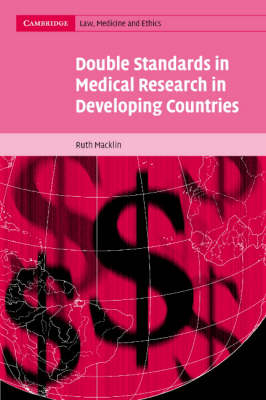
Double Standards in Medical Research in Developing Countries
Seiten
2004
Cambridge University Press (Verlag)
978-0-521-54170-1 (ISBN)
Cambridge University Press (Verlag)
978-0-521-54170-1 (ISBN)
This book examines the ethical controversies that have surrounded the design and conduct of international medical research sponsored by industrialized countries or industry, and carried out in developing countries. This is the first book to examine these issues, drawing the bold conclusion that double standards in medical research are ethically unacceptable.
This book examines the ethical controversies that have surrounded the design and conduct of international medical research sponsored by industrialized countries or industry, and carried out in developing countries. The chief concern is that research subjects in developing countries may be exploited because sponsors of research employ double standards. One debate focuses on whether the standard of care provided to subjects of medical research in developing countries should be the same as what research subjects receive in North America and Europe. Other concerns are whether the process of obtaining informed consent in developing countries is adequate, and whether prior ethical review of research meets standards that are well established in the industrialized world. Recent international developments show that essential medications can be made affordable and accessible to developing countries, and that double standards need not prevail.
This book examines the ethical controversies that have surrounded the design and conduct of international medical research sponsored by industrialized countries or industry, and carried out in developing countries. The chief concern is that research subjects in developing countries may be exploited because sponsors of research employ double standards. One debate focuses on whether the standard of care provided to subjects of medical research in developing countries should be the same as what research subjects receive in North America and Europe. Other concerns are whether the process of obtaining informed consent in developing countries is adequate, and whether prior ethical review of research meets standards that are well established in the industrialized world. Recent international developments show that essential medications can be made affordable and accessible to developing countries, and that double standards need not prevail.
Professor of Bioethics, Albert Einstein College of Medicine, New York.
1. International research contested: controversies and debates; 2. Maintaining ethical standards in research; 3. Striving for justice in research; 4. Avoiding exploitation; 5. providing safeguards: informed consent and review of research; 6. Making drugs affordable; 7. Respecting, protecting, and fulfilling human rights; 8. Striving for a single standard; Index.
| Erscheint lt. Verlag | 27.5.2004 |
|---|---|
| Reihe/Serie | Cambridge Law, Medicine and Ethics |
| Zusatzinfo | Worked examples or Exercises |
| Verlagsort | Cambridge |
| Sprache | englisch |
| Maße | 152 x 229 mm |
| Gewicht | 430 g |
| Themenwelt | Studium ► Querschnittsbereiche ► Geschichte / Ethik der Medizin |
| Recht / Steuern ► EU / Internationales Recht | |
| Recht / Steuern ► Privatrecht / Bürgerliches Recht ► Medizinrecht | |
| ISBN-10 | 0-521-54170-0 / 0521541700 |
| ISBN-13 | 978-0-521-54170-1 / 9780521541701 |
| Zustand | Neuware |
| Haben Sie eine Frage zum Produkt? |
Mehr entdecken
aus dem Bereich
aus dem Bereich
Die Geschichte eines Weltzentrums der Medizin von 1710 bis zur …
Buch | Softcover (2021)
Lehmanns Media (Verlag)
CHF 27,90
Krankheitslehren, Irrwege, Behandlungsformen
Buch | Softcover (2024)
C.H.Beck (Verlag)
CHF 55,90


